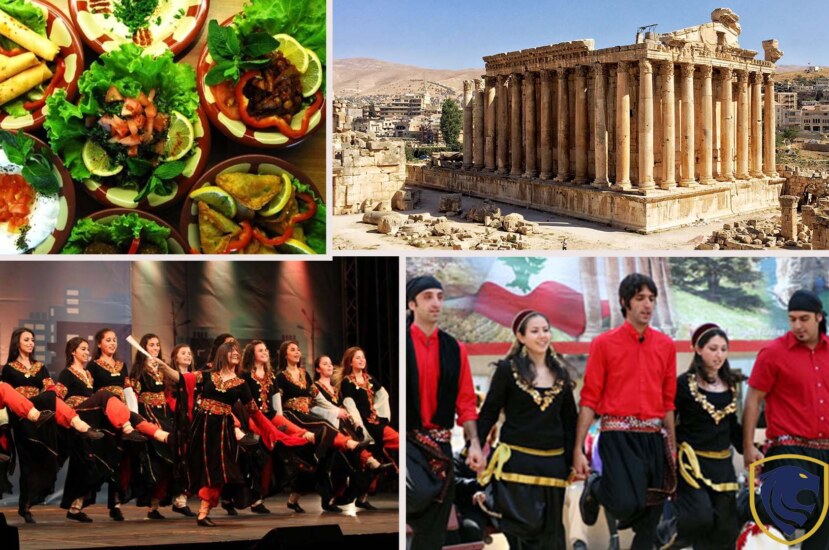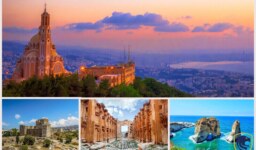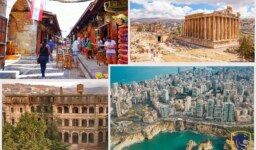Welcome to Lebanon, a place where ancient heritage and modern vitality coexist. Lebanon, nestled on the Mediterranean’s coasts, is a remarkable mix of many cultures and customs. Every nook relates stories from years ago, with a rich tapestry of historical landmarks ranging from the grandeur of Baalbek to the old beauty of Byblos. In addition, the fragrant tastes and mezze pleasures of Lebanese cuisine captivate taste buds throughout the world. The thriving nightlife of Beirut blends effortlessly with the city’s deep-rooted tradition. Lebanon’s fashion sector is a worldwide force, displaying the country’s innovation on famous runways. In the midst of this, the warmth of Lebanese hospitality pervades every contact, providing an inviting environment for visitors. As you explore the country’s cultural riches and meet its tenacious people, you’ll find a nation where tradition and modernity coexist to create a distinct character that makes an indelible mark on every visitor.
Cultural Diversity
Lebanon’s cultural tapestry is a lively mosaic made up of several strands. The nation cherishes a complex tapestry of customs and beliefs, with numerous religious factions and ethnic populations. Maronite Christians, Sunni and Shia Muslims, Druze, and other religious groups coexist in Lebanon, contributing to the country’s distinct character. Although Arabic is the official language, French and English are commonly spoken. This fact demonstrates the country’s multilingualism. This diversity is reflected in Lebanese cuisine, with dishes like falafel and kibbeh emphasizing a fusion of flavors.

Cultural Diversity
Traditional music and dance, such as the energetic Dabke, reflect centuries-old traditions. Moreover, the festivals such as Eid al-Fitr and Christmas are widely observed throughout the nation. Each group adds its own traditions, enriching Lebanon’s cultural fabric. Hospitality, a defining feature of Lebanese culture, brings these disparate groups together. Visitors are cordially welcomed and frequently share meals and tales. This cultural variety is more than a distinguishing feature. It is a source of national pride, forging Lebanon into a harmonious combination of traditions, beliefs, and common humanity.
Cuisine
Lebanese food is a gourmet treat known across the world for its excellent tastes. It’s packed with fresh ingredients and provides a fascinating combination of Mediterranean and Middle Eastern flavors. Mezze, an assortment of tiny appetizers, including meals like as hummus, tabbouleh, and falafel, encouraging a communal eating experience. In addition, Kebabs, shawarma, and kibbeh are examples of Lebanese meat preparation creativity. Furthermore, fresh veggies, olive oil, and fragrant spices are essential ingredients that enhance any recipe. Pita bread is a staple that goes with almost every meal and is ideal for scooping up dips and grilled delicacies. Sweets like baklava and ma’amoul demonstrate Lebanese pastry prowess and are frequently served with strong Lebanese coffee.

Lebanese Cuisine
Wine has a unique position in Lebanon. Because the country has historic vineyards that produce world-class wines. Arak, an anise-flavored liquor, is a popular Lebanese beverage that is typically consumed with water and ice. Food brings families and communities together. So, it is a fundamental component of Lebanese hospitality. Meals are liberally shared, showing the culture’s kindness. Lebanese cuisine is more than simply a taste. It’s a way of life that embodies the country’s rich history and cultural heritage, encouraging the rest of the globe to experience its culinary talent.
Nightlife
Lebanon’s nightlife is famed, pulsing with excitement till the wee hours of the morning. Beirut, the beating hub of Lebanese nightlife, has a thriving scene. Also, the city’s areas, such as Gemmayzeh and Mar Mikhael, are lined with stylish pubs that serve a variety of beverages and live music. Rooftop lounges provide panoramic views and a captivating ambiance. The city’s clubs are alive with music, with worldwide DJs and themed events.
Lebanese people enjoy the nightlife; cafés morph into vibrant gathering places, while shisha bars provide a relaxing ambiance. As the sun sets, the Corniche, which overlooks the Mediterranean, transforms into a walking paradise, with families and couples enjoying the sea air. In addition, casinos, such as Casino du Liban, glam up the nightlife by luring tourists with games of chance.

Nightlife
Festivals in the city, such as the Beirut International Film Festival and the Beirut Art Film Festival, provide cultural depth to the evenings. Traditional Lebanese music, ranging from dabke to modern pop, fills the air, bringing life to every part of the city. Beirut’s culinary culture never sleeps; late-night eateries provide excellent Lebanese and foreign fare.
Lebanon’s nightlife is more than simply entertainment. It’s a manifestation of the country’s dynamic spirit and love of life, where residents and visitors mingle and make wonderful experiences beneath the starlit Lebanese sky.
Historical Sites
Lebanon is a treasure mine of ancient landmarks, each of which tells a story from centuries ago. The UNESCO World Heritage Site of Baalbek displays Roman splendor with huge temples devoted to gods. For instance, Byblos, one of the world’s oldest towns, shows Phoenician, Roman, and Crusader remains, providing a unique time travel experience.
Tyre, another UNESCO World Heritage Site, is home to ancient Roman ruins, including a spectacular hippodrome. Anjar, an Umayyad city, reflects Lebanon’s rich past with a mix of Islamic and Roman architecture. In addition, Beiteddine Palace, a 19th-century architectural gem, displays excellent Lebanese architecture and offers cultural events.

Historical Sites
Sidon’s Crusader Castle has stood tall since medieval times, defending the city. The Tripoli citadel provides panoramic vistas and tells stories of historical victories. Tyre’s Al Mina ruins reveal Phoenician commerce history.
Lebanon’s historical riches extend to natural places such as the ancient cave system of Jeita Grotto and the breathtaking Qadisha Valley, which was once a haven for early Christians. Every stone and item tells a tale of Lebanon’s diverse history, making these locations more than simply historical relics, but living storytellers of Lebanon’s cultural progress.
Fashion Industry
The fashion business in Lebanon is a worldwide powerhouse, known for its originality and innovation. Beirut, dubbed the “Paris of the Middle East,” is at the epicenter of this fashionable movement. Lebanese fashion designers, such as Elie Saab and Zuhair Murad, have gained international renown for clothing Hollywood celebrities and aristocracy. Also. Lebanon’s artistry is reflected in the industry’s sumptuous materials, delicate needlework, and flawless tailoring.
Beirut Fashion Week, for example, showcases new designers with recognized designers. The industry values both classic and avant-garde aesthetics, fusing cultural legacy with current trends. Lebanon’s fashion boutiques provide a selected mix of local and international designers, providing a one-of-a-kind shopping experience.

Fashion Industry
Fashion education is highly recognized, and Beirut is home to world-class fashion institutions such as the Lebanese American University School of Design. Lebanese street fashion is varied, with youngsters expressing themselves via different styles.
Lebanese designers routinely take part in major fashion events, bringing a touch of Beirut splendor to runways throughout the world. Moreover, fashion is more than simply apparel in Lebanon; it is an art form that reflects the country’s vibrant energy and creative prowess on the world scene.




